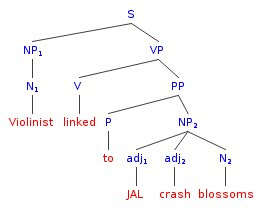 Garden path sentences are those that lead a reader down a path to an incorrect semantic and/or syntactic interpretation of the sentence during the initial analysis or parsing of the sentence. The field of psycholinguistics has shown that these incorrect interpretations occur because readers process sentences one word at a time.
Garden path sentences are those that lead a reader down a path to an incorrect semantic and/or syntactic interpretation of the sentence during the initial analysis or parsing of the sentence. The field of psycholinguistics has shown that these incorrect interpretations occur because readers process sentences one word at a time.A simple yet cogent example of a garden path sentence is:
The old man the boat.
When reading this sentence the most likely initial interpretation (illustrated by the syntactic tree below) is that "old" is an adjective describing "man". But what happens when you get to "the boat"? This can't be a sentence without a verb.
 By backtracking and reading the sentence again the proper interpretation with "old" being a collective noun and "man" being a verb can be reached. In other words, "the boat is manned by the old (people)."
By backtracking and reading the sentence again the proper interpretation with "old" being a collective noun and "man" being a verb can be reached. In other words, "the boat is manned by the old (people)." 
Similar to garden path sentences are newspaper headlines that are written in such a way as to lead a reader to an incorrect interpretation (often by omission of words). These headlines have been dubbed "crash blossoms" based on the following headline:

Here is a diagram of the likely initial interpretation followed by a diagram of the intended interpretation (with words added for clarification).
Parse 1:
 Parse 2:
Parse 2: Language Log posted more about the evolution of the name "crash blossoms" here.
Language Log posted more about the evolution of the name "crash blossoms" here.And here are two additional crash blossoms that I find particularly amusing followed by their respective conflicting syntactic trees.

Parse 1:
 Parse 2:
Parse 2:

Parse 1:

Parse 2:


Syntactic trees can be very helpful in analysing garden path sentences.
ReplyDeleteCould you tell me where you got the other images? They seem very familiar.
I must admit I haven't realized that such sentences exist. Sorry for possible mistakes.
ReplyDeleteI hope I will learn something from your notes:-)
Stan - I apologize for not giving links to the headlines. I always try to give credit when possible and the only reason I didn't here is because there are numerous sites that contain images of these headlines. From what I can gather, these are the links to the original posts in the order that they appear in this post:
ReplyDeletehttp://www.japantoday.com/category/entertainment-arts/view/violinist-reinvents-child-prodigy-image-linked-to-jal-crash-tragedy
http://abcnews.go.com/Business/wireStory?id=8653746
http://www.daytondailynews.com/o/content/shared-gen/blogs/dayton/daytoncrime/entries/2010/02/12/man_shot_in_chest_and_leg_knoc.html
I have also seen and read about these crash blossom headlines on some outstanding linguistics blogs including:
Language Log - http://languagelog.ldc.upenn.edu/nll/
Sentence First - http://stancarey.wordpress.com/
and
Literal-Minded - http://literalminded.wordpress.com/
I found this on a photographer's web site:
ReplyDeleteA picture of a sign on a dumpster in Bozeman, Montana reads:
See Grizzly BEARS
EXIT NOW
Larry Blackwood's caption reads:
"I sat next to this dumpster for the longest time, never saw a single bear exit, or enter for that matter."
http://www.larryblackwood.com/POTD/potd_i000225.jpg
JCR - Thanks for sharing. I love it and will share the picture and link with my readers.
ReplyDeleteThanks for responding, Laura. One of the blogs you mention, Sentence first, is my own. I've written a few posts about crash blossoms, and the images I've used match the (non-syntactic-tree) images here precisely — the cropping is identical. That's why I wondered where you found them.
ReplyDeleteThe images are not mine to claim; I just took screengrabs, cropped them and posted them. Their reappearance doesn't bother me. But a little courtesy goes a long way. (See for example Fritinancy's post on crash blossoms.)